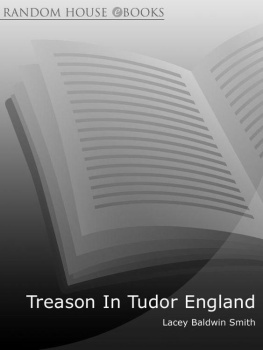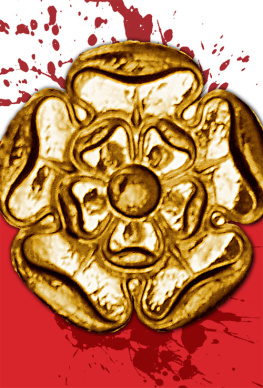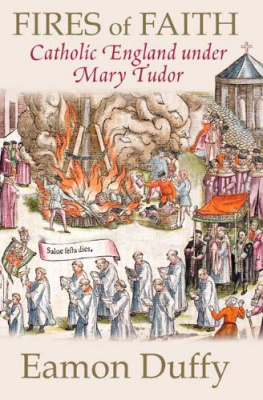TREASON IN TUDOR ENGLAND
Politics and Paranoia

LACEY BALDWIN SMITH

This eBook is copyright material and must not be copied, reproduced, transferred, distributed, leased, licensed or publicly performed or used in any way except as specifically permitted in writing by the publishers, as allowed under the terms and conditions under which it was purchased or as strictly permitted by applicable copyright law. Any unauthorised distribution or use of this text may be a direct infringement of the authors and publishers rights and those responsible may be liable in law accordingly.
Version 1.0
Epub ISBN 9781446475072
www.randomhouse.co.uk
Published by Pimlico 2006
2 4 6 8 10 9 7 5 3 1
Copyright Lacey Baldwin Smith 1986
Lacey Baldwin Smith has asserted his right under the Copyright, Designs and Patents Act 1988 to be identified as the author of this work
This book is sold subject to the condition that it shall not, by way of trade or otherwise, be lent, resold, hired out, or otherwise circulated without the publishers prior consent in any form of binding or cover other than that in which it is published and without a similar condition including this condition being imposed on the subsequent purchaser
First published in Great Britain by Jonathan Cape in 1986
Pimlico edition 2006
Pimlico
Random House, 20 Vauxhall Bridge Road,
London SW1V 2SA
Random House Australia (Pty) Limited
20 Alfred Street, Milsons Point, Sydney,
New South Wales 2061, Australia
Random House New Zealand Limited
18 Poland Road, Glenfield,
Auckland 10, New Zealand
Random House South Africa (Pty) Limited
Isle of Houghton, Corner of Boundary Road & Carse OGowrie,
Houghton 2198, South Africa
Random House UK Limited Reg. No. 954009
A CIP catalogue record for this book is available from the British Library
ISBN 1844135519
ISBN 9781844135516 (from Jan 2007)
CONTENTS
To Jean
Without whose devotion, critical sense and manifold skills, this book would neither have been conceived nor completed
PIMLICO
TREASON IN TUDOR ENGLAND
Lacey Baldwin Smith was Professor of English History at Northwestern University, Illinois. The recipient of M.A. and Ph.D. degrees from Princeton University, he has been a Fulbright Scholar, a Guggenheim Fellow, a Senior Fulbright Fellow at the University of London and a Senior Fellow of the National Endowment for the Humanities.
IN THANKS
Scholarship, almost by definition, is a collective enterprise: the product of ideas gleaned from a host of unlikely sources, tested upon a myriad of long-suffering friends, and nurtured in a very special environment. I am grateful to my colleagues in the History Department who individually and collectively have supplied sometimes knowingly, sometimes inadvertently that intellectual atmosphere and challenge which are the indispensable conditions for scholarship. And I am indebted to Northwesterns College of Arts and Sciences and the National Endowment for the Humanities for their generous support.
I
TREASON DOTH NEVER PROSPER
Treason doth never prosper, whats the reason?
For if it prosper, none dare call it treason.
Sir John Harington, Epigrams
Sir John Haringtons terse lines not only contain a grim-fisted truth success writes its own history and imposes upon sedition a self-fulfilling dynamism whereby treason, by definition, is branded failure but the rhyme also goes to the core of the Tudor political mentality and poses a question that has baffled historians over the centuries. Why did traitors indulge in a variety of sedition so unbelievably bungling and self-defeating in character that it is difficult to believe they were totally sane or that their treason, as perceived by the government, actually existed at all? If sedition had been nothing more than an occasional aberration upon the normal graph of Tudor political activity, the question might not be worth the asking. The century, however, was a veritable graveyard of unsuccessful intrigues, machinations, complots, and conspiracies. The grisly skulls decorating London Bridge and the mutilated corpses displayed throughout the kingdom were evidence enough that men risked their lives for reasons noble and ignoble, and that they knew the unpleasant consequences of failure. To confess the truth, sighed one observer in 1541, it is now no novelty among us to see men slain, hanged, quartered or beheaded Some for one thing and some for another. So why then did traitors by their conduct play into societys hands and get caught, and conversely why did society see in such performances motives and actions dangerous to all established order, both human and divine?
Tudor England had a straightforward answer at least to the first half of the question: traitors reckoned with God as well as man. Their treachery could not long remain hidden, for God will have that most detestable vice both opened and punished. It is little wonder that society believed God loved and protected the prince and detested and destroyed the traitor, for the malcontents of the century entered into sedition with such abandon, naivety and babbling indifference to the most elementary principles of secrecy, and seemed to believe that almost any scheme was possible simply by willing it into existence, that even the humblest sparrow was quite capable of frustrating their evil designs.
Our own age is less willing to accept the deity either as a detective agency or as an instrument of vengeance, and it suspects that God more often than not leaves men to arrange for their own destruction and punishment. Even the sixteenth century acknowledged that the bird of the air had considerable help from the fear of judicial interrogation with benefit of rack and dungeon and from the terror of the traitors agonizing and humiliating end hanging, castration, and disembowelment. Erasmus, as was his wont, hedged his bets and warned in words memorized by schoolboys all over Europe that kings have many ears and many eyes They have ears that listen a hundred miles from them; they have eyes that espy out more things than men would think. Wherefore, it is wisdom for subjects not only to keep their princes laws and ordinances in the face of the world but also privily for conscience sake.
Cecils cynical limiting of the causes of treason to personal greed and simple-minded political and economic ineptitude made no allowance for ideology or governmental policies that could drive a man to sedition. And he totally ignored both the frequency and style of the endless efforts to overthrow the existing order. Tudor treason was protean, but whatever face it assumed feudal, religious, political, economic, or personal it tended to be not only unbelievably maladroit but also more wildly fantastic than any fiction. Embedded in this current of deviant malcontent was a self-destructiveness and hysteria that far exceeded mere artless mismanagement and bordered upon the neurotic.
Much of the treachery of the century appears so absurd and so juvenile that some scholars have suggested that many of the plots were, in fact, fictitious. They never existed at all but were more or less bogus figments in which agents-provocateurs were sacrificed to the exigencies of party politics. If care is maintained in selecting the evidence, it is quite possible to argue that such plots as the Lopez, Moody, Squire, and Stanley schemes to assassinate Elizabeth by a variety of unlikely means, including deadly perfumes, balls of fatal incense, poisoned potions, and silver bullets, were carefully orchestrated trumperies in which relatively innocent, albeit not overly bright, political small-fries fell victim either to deliberate government efforts to demonstrate the existence of treason or to the political machinations of court factions. Nevertheless, to dismiss such performances as calculated fabrications is to misunderstand the pressures under which traitors themselves operated, the hysterical response their treason generated, and the mentality that could translate real or imagined sedition into a fundamental threat to all good order on earth and throughout the universe.


















